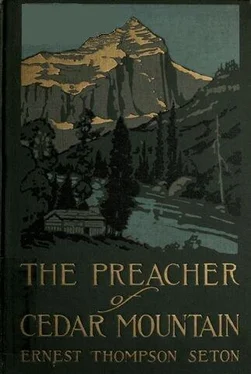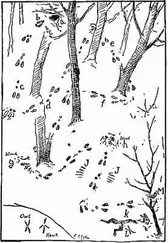Ernest Seton - The Preacher of Cedar Mountain
Здесь есть возможность читать онлайн «Ernest Seton - The Preacher of Cedar Mountain» весь текст электронной книги совершенно бесплатно (целиком полную версию без сокращений). В некоторых случаях можно слушать аудио, скачать через торрент в формате fb2 и присутствует краткое содержание. Год выпуска: 2009, Жанр: Прочие приключения, на английском языке. Описание произведения, (предисловие) а так же отзывы посетителей доступны на портале библиотеки ЛибКат.
- Название:The Preacher of Cedar Mountain
- Автор:
- Жанр:
- Год:2009
- ISBN:нет данных
- Рейтинг книги:3 / 5. Голосов: 1
-
Избранное:Добавить в избранное
- Отзывы:
-
Ваша оценка:
- 60
- 1
- 2
- 3
- 4
- 5
The Preacher of Cedar Mountain: краткое содержание, описание и аннотация
Предлагаем к чтению аннотацию, описание, краткое содержание или предисловие (зависит от того, что написал сам автор книги «The Preacher of Cedar Mountain»). Если вы не нашли необходимую информацию о книге — напишите в комментариях, мы постараемся отыскать её.
The Preacher of Cedar Mountain — читать онлайн бесплатно полную книгу (весь текст) целиком
Ниже представлен текст книги, разбитый по страницам. Система сохранения места последней прочитанной страницы, позволяет с удобством читать онлайн бесплатно книгу «The Preacher of Cedar Mountain», без необходимости каждый раз заново искать на чём Вы остановились. Поставьте закладку, и сможете в любой момент перейти на страницу, на которой закончили чтение.
Интервал:
Закладка:
"Well, this is all a great surprise to me," said Hartigan; and again his deepest astonishment lay in the new knowledge of the papist, rather than of the Indian.
They were several hours together. The missionary and his Indian friends finally left the train at a station nearest their home in Pine Ridge and Jim was left alone with some very new ideas and some old-time prejudices very badly shaken.
The rest of the journey he sat alone, thinking—thinking hard.
There was no one to meet him at the Cedar Mountain station when he stepped out of the car—the last passenger from the last car, in the last station—for at that time this was the north end of the track. All his earthly belongings, besides the things he wore, were in a valise that he carried in his hand; in his pocket he had less than five dollars in money, and his letter of introduction to the Rev. Dr. Jebb of Cedar Mountain.
In all his life, Jim had never seen a mountain, nor even a high hill; and he stood gazing at the rugged pile behind the town with a sense of fascination. It seemed so unreal, a sort of pretty thing with pretty little trees on it. Was it near and little, or far and big? He could not surely tell. After gazing a while, he turned to the railway agent and said:
"How far off is that mountain top?"
"A matter of two miles," was the answer.
Two miles! It did not seem two hundred rods; and yet it did, for the man on horseback half way there looked toy-like; and the distance grew as he gazed. A rugged, rocky pile with white snow-ravines still showing in the springtime sun, some scattering pines among the ledges and, lower, a breadth of cedars, they were like a robe that hid the shoulders and flanks of the mountain, then spread out on the plain, broken at a place where water glinted, and later blended with the purple sage that lent its colour to the view.
It was all so new and fairylike; "the glamour and dhrei that the banshee works on the eyes of men," was the thought that came, and the Irish tales his mother used to tell of fays and lepricauns seemed realized before his eyes. Then, acting on a sudden impulse, he dropped his bag and started off, intent on going up the mountain.
Swinging a stick that he had picked up, he went away with long, athletic strides, and the motor engines of his frame responding sent his blood a-rushing and his spirit bounding, till his joy broke forth in song, the song of the singing prophet of Judea's hills, a song he had learned in Coulter for the sweetness of the music rather than for its message:
How beautiful upon the mountains Are the feet of him that bringeth good tidings, That publisheth peace, That bringeth good tidings of good, That publisheth salvation, That saith unto Zion, "Thy God reigneth."
And when he reached the cedar belt he knew that the railway man had spoken the truth, but he held on up the ever-steepening trail, ceasing his song only when he needed the breath to climb. A cottontail waved its beacon for a minute before him, then darted into the underbrush; the mountain jays called out a wailing cry; and the flicker clucked above. Sharp turns were in the trail, else it had faced an upright cliff or overshot a precipice; but it was easily followed and, at length, he was above the cedars. Here the horse trail ended, but a moccasin path went on. It turned abruptly from a sheer descent, then followed a narrow knife edge to rise again among the rocks to the last, the final height, a little rocky upland with a lonely standing rock. Here Jim turned to see the plain, to face about and gasp in sudden wonder; for the spell of the mountain seen afar is but a little echo of the mountain power when it has raised you up.
He recalled the familiar words, not understood till now:
"Thy mercies are like mountains great, Thy judgments are like floods."
He gazed and his breath came fast as he took in the thought, old thoughts, yet new thoughts, strong and elusive, and wondered what he had found.
Crossing the little upland, he approached its farther end and stood by the pinnacle of rock that, like a lonely watchman, forever looked down on the blue and golden plains. A mountain chipmunk stared at him, flicked its tail, and dived under a flat ledge; a bird whose real home was a thousand miles off in the north faced the upland breeze and sang in its unknown tongue. Jim drew still nearer the rocky spire, rounded a ledge, and faced an unexpected sight. In a little open lodge of willows, bent and roofed with a canvas cover, sat an Indian youth, alone, motionless, beside him was a pot of water, and between him and the tall rock, a little fire, from which a tiny thread of smoke arose.
Hartigan started, for that very morning he had learned from the old Jesuit enough about the Red-men to know that this was something unusual. On the rock beyond the fire he saw, painted in red, two symbols that are used in the Red-man's prayers: "the blessed vision" leading up to the "spirit heart of all things." A measure of comprehension came to him, and Father Cyprian's words returned in new force.
The lad in the little lodge raised a hand in the sign of "Stop," then gently waved in a way that, in all lands and languages, means: "Please go away." There was a soft, dreamy look in his face, and Jim, realizing that he had entered another man's holy place, held back and, slowly turning, sought the downward trail.
It came to him clearly now this was one of the interesting things told him that morning by the Jesuit. This Indian boy was taking his hambeday , his manhood fast and vigil; seeking for the vision that should be his guide, he was burning his altar fire beside the Spirit Rock.
As he retraced his steps the wonder of this new world enveloped Jim. At the edge of the cedars he paused and, looking out over the great expanse of green plumage, he said aloud: "All my life have I lived in the bottom of a little narrow well, with barely a glimpse of the sky, and never a view of the world. Now I am suddenly brought forth to see the world and the bigness of the heavens, and the things I dimly got from books are here about me, big, living, actual."
He was himself so much, could he be also a part of this wonder-world? It seemed impossible, so wholly new was everything it held.
CHAPTER XI
A New Force Enters His Life
Back at the railway station, Hartigan looked for his bag where he had dropped it, but it was gone. The agent, glancing across and divining his quandary, said stolidly:
"I guess Dr. Jebb took it. Ain't you the party he's looking for? He said 'J. H.' was the initials. You'll find him at that white house with the flowers just where the boardwalk ends."
Jim went down the road with alert and curious eyes and presented himself at the white cottage. He found a grave and kindly welcome from Mrs. Jebb—a stout, middle-aged, motherly person—and from the Rev. Josiah Jebb, D.D., M.A., etc., pastor of the Methodist Church and his principal to be for the coming year.
A gentle, kindly man and a deep scholar, Dr. Jebb had no more knowledge of the world than a novice in a convent. His wife was his shield and buckler in all things that concerned the battle with men and affairs; all his thoughts and energies were for his pulpit and his books.
Failing health rather than personal fitness had to do with Dr. Jebb's being sent to the hills. But the vast extent of territory in his charge, the occasional meetings in places separated by long hard rides, together with the crude, blunt ranch and farmer folk who were his flock—all called for a minister with the fullest strength of youth and mental power. It was to meet this need that the trustees of the church had sent James Hartigan to supplement the labours of the Rev. Dr. Jebb. Thus these two, diverse in every particular of bodily and mental equipment, were chosen to meet the same religious problem.
Читать дальшеИнтервал:
Закладка:
Похожие книги на «The Preacher of Cedar Mountain»
Представляем Вашему вниманию похожие книги на «The Preacher of Cedar Mountain» списком для выбора. Мы отобрали схожую по названию и смыслу литературу в надежде предоставить читателям больше вариантов отыскать новые, интересные, ещё непрочитанные произведения.
Обсуждение, отзывы о книге «The Preacher of Cedar Mountain» и просто собственные мнения читателей. Оставьте ваши комментарии, напишите, что Вы думаете о произведении, его смысле или главных героях. Укажите что конкретно понравилось, а что нет, и почему Вы так считаете.




